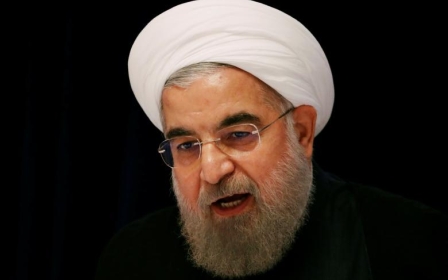Iranian supreme leader slams Rouhani's economic policies

Iran's supreme leader, Ayatollah Ali Khamenei, said on Monday the government's economic policies had fallen short and called for a new "resistance economy" to create jobs, piling pressure on the president before May elections.
Hardliners led by Khamenei have repeatedly criticised President Hassan Rouhani, particularly for the terms of the nuclear deal he reached with world powers which lifted economic sanctions and was supposed to boost the economy.
I feel bitterness with all my heart. I feel the bitterness that the people experience
- Ayatollah Ali Khamenei
However, the supreme leader said many in Iran had experienced "the bitter and difficult events" that were "mostly related to the people’s economic and livelihood problems", according to a translation provided by the Fars news agency.
"The middle and lower classes of society were suffering from these problems and they continue to do so in the present time," he said.
"I feel bitterness with all my heart. I feel the bitterness that the people experience.
"And this bitterness is related to economic matters and problems such as high prices, unemployment and social detriments.
"Well, all of us are responsible. However, there is a large gap between what has been carried out, and what the people and what we expect.
"I call the new year, a year of resistance economy, production and employment."
Khamenei's supporters have used the phase "resistance economy" to describe measures to make Iran more self-sufficient, in contrast to Rouhani's policy of seeking to open Iran to more international trade and investment.
The conservatives who aim to stop Rouhani winning a second four-year term, have yet to identify their candidate, but a number of prominent hardliners have lined up to criticise his handling of the economy.
Rouhani, for his part, issued a New Year's message touting the economic achievements of his government and calling for citizens' rights to be respected, points likely to resonate with his supporters in the approaching election.
What we achieved in curbing inflation (and boosting) economic growth... was unprecedented
- Hassan Rouhani
"What we achieved in curbing inflation (and boosting) economic growth and jobs in the past year was unprecedented in the past 25 years," Rouhani said in a message on state TV.
Rouhani also said the "security environment" in cultural and social affairs must be put aside.
The starkly different messages from the supreme leader and the president could polarise voters ahead of the presidential election.
The New Year, or Nowruz, is the nation's most important holiday. It marks the start of spring and is usually celebrated on 21 March, the previous day or the following day in a tradition that has lasted thousands of years.
Middle East Eye propose une couverture et une analyse indépendantes et incomparables du Moyen-Orient, de l’Afrique du Nord et d’autres régions du monde. Pour en savoir plus sur la reprise de ce contenu et les frais qui s’appliquent, veuillez remplir ce formulaire [en anglais]. Pour en savoir plus sur MEE, cliquez ici [en anglais].




